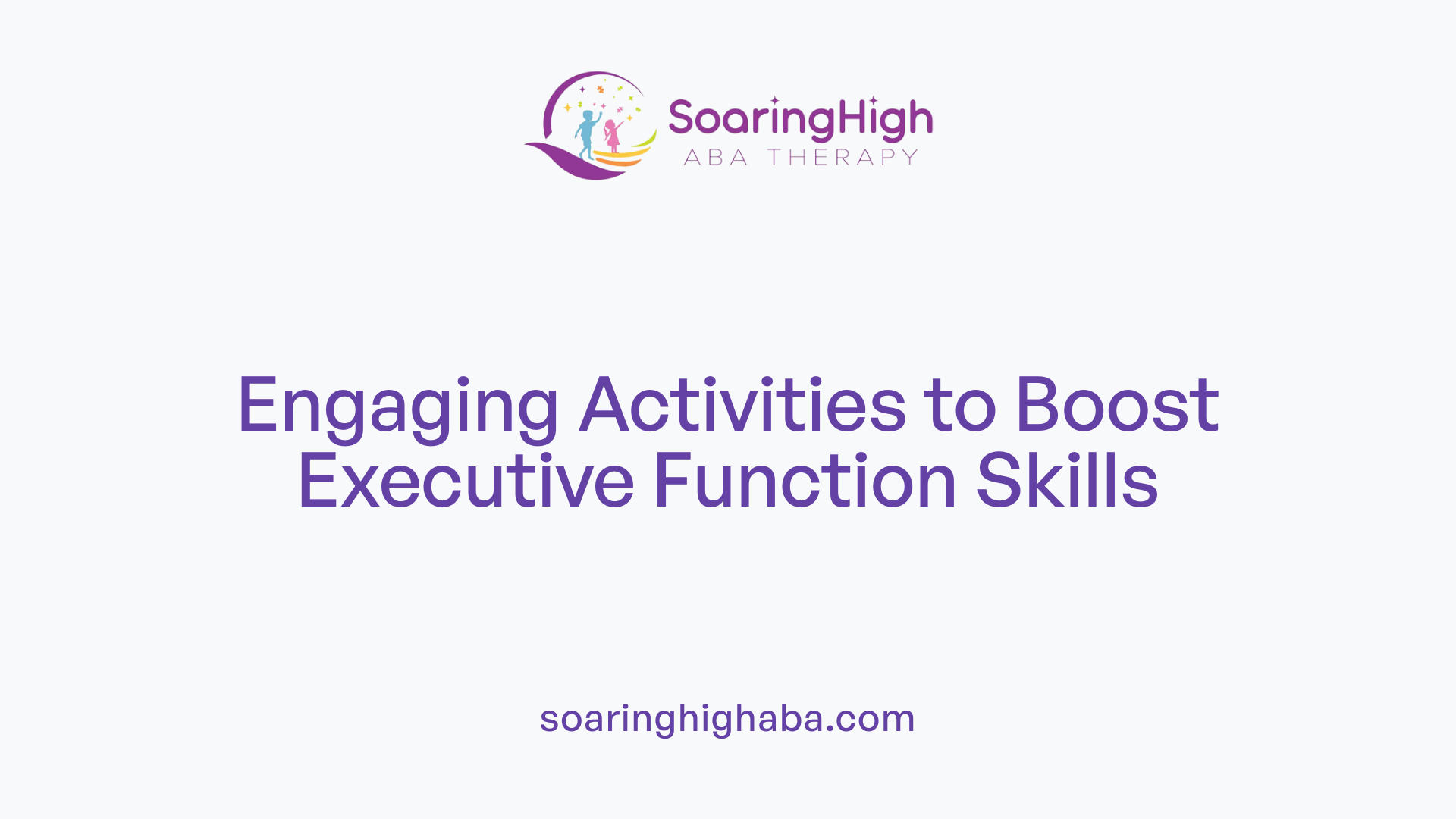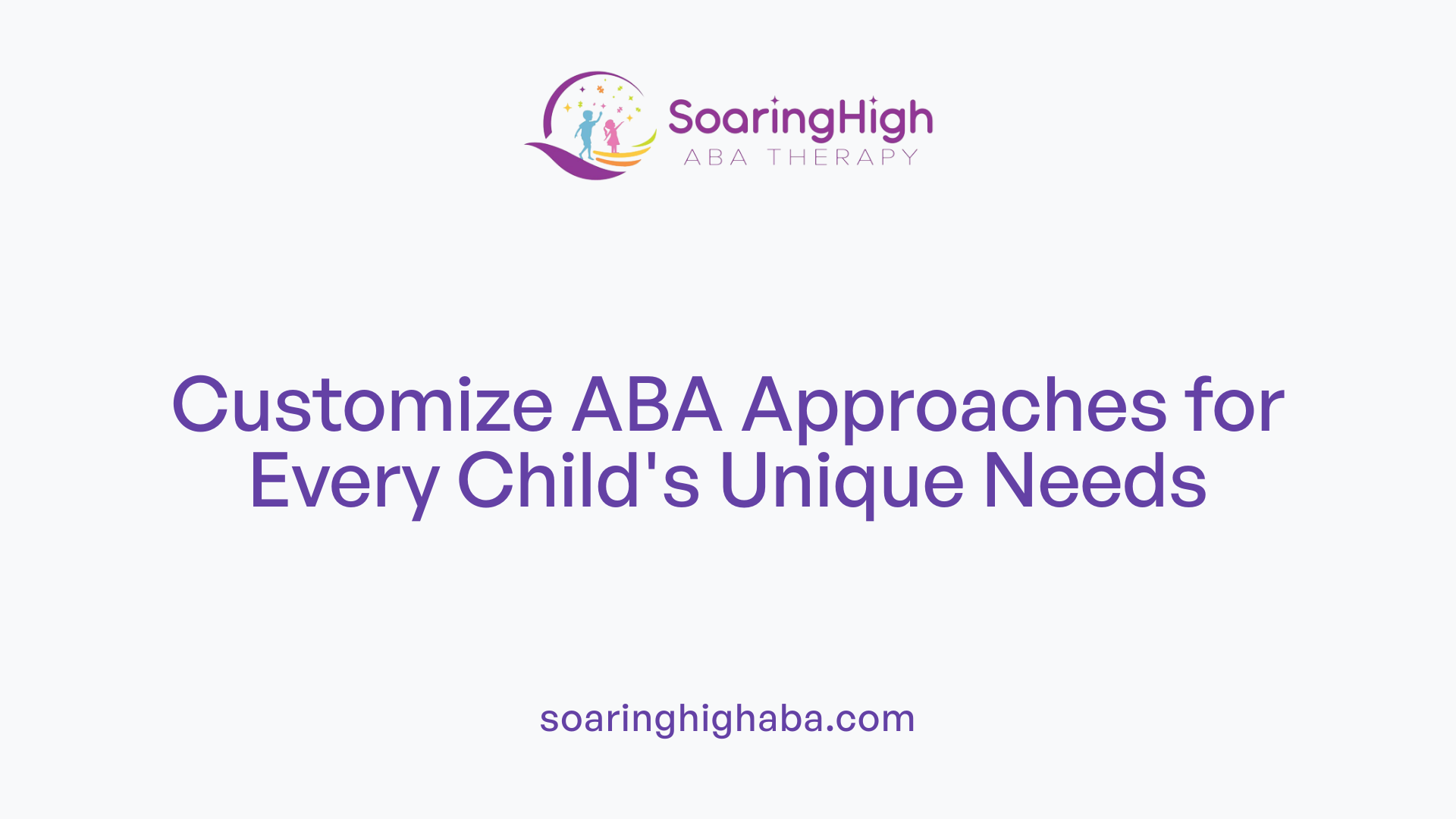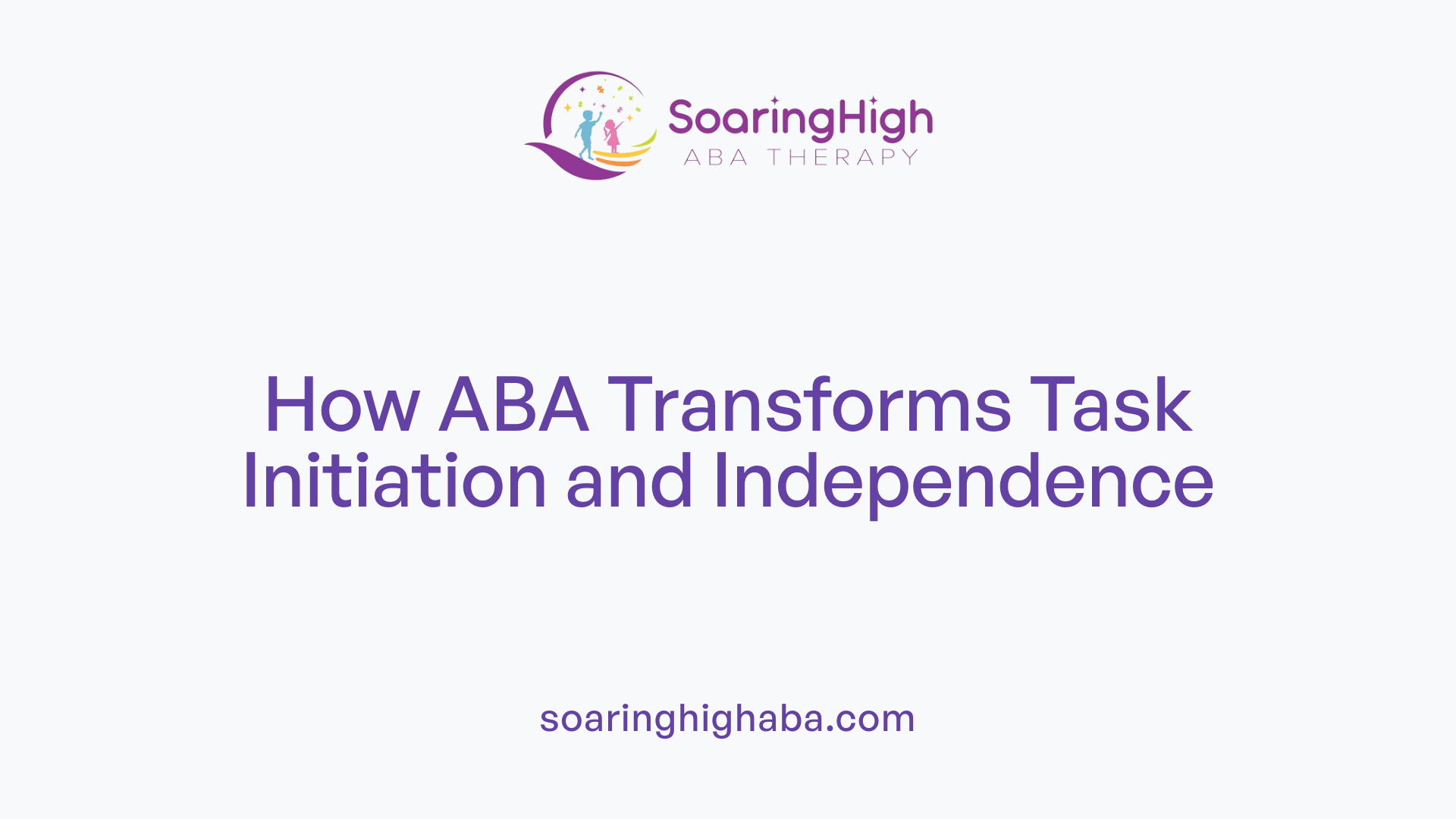Understanding the Importance of Task Initiation in Childhood Development
Task initiation is a critical component of executive functioning that enables children to independently start and respond to instructions, generate ideas, and solve problems. Developing this skill is essential for academic success, daily routines, and social interactions. Children with autism spectrum disorder (ASD), ADHD, and other learning challenges often struggle with initiating tasks, which can hinder their independence and overall development. Applied Behavior Analysis (ABA) emerges as an effective intervention strategy that systematically targets these challenges, helping children overcome barriers to initiating tasks and fostering greater autonomy.
The Role of Executive Function in Child Development

What is executive function?
Executive function encompasses a set of mental skills that are essential for goal-oriented behavior. These skills include planning, organization, time management, self-monitoring, response inhibition, emotional control, sustained attention, task initiation, and cognitive flexibility. They work together to help children manage their thoughts, actions, and emotions effectively, enabling them to adapt to new situations and solve problems efficiently.
Which components of executive function involve task initiation?
Task initiation is a vital part of executive functioning. It refers to the ability to independently start tasks or respond promptly to instructions. This skill is crucial for academic success, social participation, and daily independence. Other components include working memory, which supports holding information temporarily; cognitive flexibility, which allows shifting between tasks or ideas; and inhibitory control, helping children resist impulses.
How do executive skills develop over time?
Unlike innate traits, executive functioning skills develop gradually throughout childhood. Early childhood is characterized by rapid growth in skills like attention and self-control. As children grow, they refine their planning, organization, and problem-solving abilities through experience and learning. This developmental process continues into adolescence and early adulthood, influenced by biological maturation and environmental support.
Strategies to support development
Implementing targeted activities can boost executive skills. Sorting games, pattern recognition tasks, cooking or grocery shopping, and role-playing activities help improve planning and organization. Visual aids like schedules and checklists make tasks clearer and foster independence. Games that involve timing, sequencing, or flexible thinking—such as Simon Says or maze puzzles—can develop cognitive flexibility and response inhibition.
How can therapy help strengthen executive functions?
Therapeutic interventions play a critical role. Occupational therapists use structured routines, visual support tools, and sensory activities to boost skills like task initiation and emotional regulation. Speech and language therapies improve sequencing, verbal reasoning, and self-monitoring through story sequencing and turn-taking exercises. Cognitive-behavioral therapy addresses emotional regulation and goal-setting, especially for children facing behavioral challenges.
What role does ABA therapy play?
Applied Behavior Analysis (ABA) is a structured, evidence-based approach that uses positive reinforcement, skill-building techniques, and behavior analysis. For children with autism spectrum disorder (ASD) or ADHD, ABA helps improve task initiation, reduce impulsivity, and develop social and communication skills. Techniques such as task analysis—breaking complex skills into manageable steps—and token reward systems motivate children to begin and persist with tasks. Consistent data collection and collaboration with families ensure tailored, effective interventions.
Supporting children at home and school
Parents and educators can foster executive skills by establishing routines, breaking tasks into smaller steps, and providing visual tools like charts and checklists. Modeling problem-solving and offering positive reinforcement motivate children to practice independence. Using visual supports and setting time goals can make starting tasks more approachable, helping children develop lifelong skills for success.
| Support Strategies | Description | Benefits |
|---|---|---|
| Visual aids | Schedules, checklists | Clarifies tasks and promotes independence |
| Task analysis | Breaking tasks into steps | Simplifies complex activities |
| Positive reinforcement | Rewards for success | Increases motivation and task initiation |
| Routine establishment | Consistent daily schedules | Builds predictability and security |
| Modeling and prompts | Demonstrating problem-solving | Encourages imitative learning |
What are some measurable goals for improving task initiation?
Goals tailored to individual needs might include starting tasks within a specific time frame after receiving instructions, identifying the correct order of multiple tasks, or initiating non-preferred activities using visual supports. Consistent use of these goals promotes progress and independence in everyday activities.
How does Executive Functioning Coaching support children?
Executive functioning coaching personalizes strategies to enhance self-management skills like planning, organization, and flexibility. It involves collaboration with families and schools and focuses on fostering self-awareness, adaptation, and problem-solving. These tailored interventions lead to better academic performance, increased independence, and improved social interactions in children.
This comprehensive support across therapy, home, and school environments ensures children develop the executive skills necessary for lifelong success.
The Developmental Trajectory of Executive Skills and How ABA Fits In

How do executive skills develop in children?
Executive functions are a set of mental skills that enable children to plan, organize, and complete tasks effectively. These include abilities such as working memory, cognitive flexibility, inhibitory control, emotional regulation, time management, and task initiation. Unlike innate traits, these skills develop gradually throughout childhood, shaped by experiences, learning, and intervention strategies.
During early childhood, children begin to improve in their ability to control impulses and pay attention. As they grow, they gain skills for problem-solving, flexible thinking, and managing emotions. The development of these skills is crucial for academic success, social interactions, and daily independence. However, it often follows an uneven pattern, with some children improving faster than others, especially those with developmental challenges.
Why is early intervention important?
Addressing executive function challenges early can significantly impact a child's learning and social life. Early intervention helps children develop foundational skills such as task initiation and self-regulation, preventing future difficulties. It also builds confidence and promotes independence, making transitions and classroom activities smoother.
Interventions like therapy, especially Applied Behavior Analysis (ABA), support children by teaching strategies tailored to their individual needs. These early efforts can improve a child's ability to manage their behaviors, focus on tasks, and adapt to changing routines.
How does therapy help strengthen executive functions?
Various therapies play a vital role in developing and strengthening executive skills. ABA therapy, for instance, uses positive reinforcement and structured routines to teach and reinforce desired behaviors.
In ABA, therapists break down complex skills into manageable steps, utilize visual supports such as checklists, and use reinforcement tokens to motivate children. Pivotal Response Training emphasizes motivation and self-regulation through play-based strategies, fostering better engagement and behavioral control.
Occupational therapy is another essential approach, providing structured routines, visual schedules, sensory integration activities, and self-regulation techniques. Speech and language therapy help improve working memory and sequencing skills via activities like story sequencing and turn-taking games.
Cognitive-behavioral therapy (CBT) focuses on modifying negative thought patterns, teaching goal-setting, and problem-solving strategies to enhance emotional regulation and planning.
Collaborative efforts among therapists, parents, and educators ensure consistent support across different environments, maximizing each child's development of executive functions. Through these methods, children learn to start tasks independently, manage their impulses, and adapt effectively to new challenges.
Strategies and Activities for Enhancing Executive Function

What activities can help improve executive skills?
Enhancing executive functioning skills can be achieved through engaging in a variety of age-appropriate activities designed to strengthen different cognitive and behavioral areas. These activities focus on developing skills such as planning, organization, self-monitoring, response inhibition, emotional control, and task initiation.
Examples of activities suitable for different ages
Children benefit from simple sorting games, copying block structures, and classic classroom games like Simon Says, Freeze Dance, and Red Light-Green Light. These games help improve response inhibition, flexibility, and sustained attention. Cooking or baking activities encourage planning and sequencing, while grocery shopping offers real-world opportunities for organization and decision-making.
Role reversal teaching, visual aids such as schedules and checklists, and turn-taking games promote social skills and flexibility. Puzzle activities like mazes, hidden-picture challenges, and making predictions foster problem-solving and cognitive flexibility. Yoga and movement-based activities like dance or stretching exercises support self-regulation and emotional control.
How activities target task initiation
Many of these activities specifically help develop the ability to start tasks independently. For example, breaking down a baking activity into steps encourages children to initiate each task without prompting. Visual checklists or schedules serve as prompts to start and complete tasks in sequence.
Engaging in preferred activities first can motivate children to initiate work on less preferred tasks. Reinforcing successful task initiation with praise, tokens, or preferred rewards builds confidence and establishes a positive routine. These practices, incorporated into daily activities, help children learn to start tasks promptly and sustain effort, crucial skills for academic and daily success.
Behavioral Techniques and Reinforcement Methods in ABA

What are the benefits of ABA therapy in helping children initiate tasks?
ABA therapy provides essential support in helping children start tasks independently. By teaching children to break down complex skills into smaller, manageable steps through methods like task analysis, ABA makes initiating activities less overwhelming. Positive reinforcement plays a vital role by rewarding desired behaviors, which encourages children to engage more actively in tasks.
Structured routines and visual supports, such as checklists and calendars, further facilitate task initiation. These strategies help children develop independence in starting and completing activities, whether at home or school. Moreover, ABA techniques promote consistency and reinforce learning through immediate feedback, allowing children to transfer skills across various settings.
Family involvement is integral, ensuring reinforcement strategies are consistent both at home and in therapy sessions. Data collection allows therapists to monitor progress precisely and tailor interventions to individual needs. When applied effectively, ABA boosts confidence, improves communication, and encourages autonomy, making task initiation easier and more reliable.
Strategies Used in ABA Therapy
| Technique | Description | Purpose |
|---|---|---|
| Positive Reinforcement | Giving rewards like tokens or praise when a child starts and completes tasks | Encourages repeated desired behaviors |
| Discrete Trial Training (DTT) | Breaking skills into small steps with frequent repetitions and prompts | Builds foundational skills efficiently |
| Pivotal Response Training (PRT) | Plays-based approach focusing on motivation, self-regulation, social skills | Promotes engagement and generalization |
| Differential Reinforcement | Reinforcing desired behaviors while ignoring or minimizing reinforcement for undesired ones | Reduces problem behaviors and increases adaptive skills |
Benefits of ABA in Supporting Task Initiation
Using these strategies, ABA therapy helps children learn how to initiate tasks effectively. It helps them develop the skills necessary for independence, such as transitioning between activities and managing materials. Over time, children become more confident, socially competent, and capable of handling daily demands without excessive support.
Tailoring ABA Interventions to Individual Needs

What goals are targeted in ABA interventions to improve task initiation in children?
ABA (Applied Behavior Analysis) therapies are highly personalized, with interventions designed to target specific skills such as task initiation. The primary goal is to help children become more independent in starting tasks promptly and with minimal prompts. This involves teaching children to initiate preferred activities within a set time, encouraging them to begin tasks independently, and reducing reliance on prompts or cues.
Interventions typically include strategies like visual supports such as checklists and timers, as well as structured routines, to help children recognize when to start tasks and how to do so effectively. Therapists also work on developing problem-solving skills that allow children to overcome common barriers to initiating tasks.
A crucial component is generalizing these skills across various environments—home, school, and community—and ensuring consistency in their application. Goals may also include mastering daily routines like toileting, dressing, or household chores, alongside improving communication, social interaction, and community safety related to initiating interactions.
Ultimately, the core aim is to foster children’s ability to start tasks independently and efficiently, promoting greater autonomy and improving overall functional skills. This approach not only enhances day-to-day independence but also supports long-term success in educational and social settings.
| Aspect | Description | Additional Details |
|---|---|---|
| Goal Example | Initiate tasks within a specific time frame | Using visual timers and prompts |
| Skills Targeted | Independence, problem-solving, flexibility | Across different settings and contexts |
| Interventions | Visual supports, structured routines, reinforcement | Based on individual needs |
| Routine Skills | Toileting, dressing, household chores | Focused on daily living skills |
| Broader Objectives | Social initiation, language, community safety | Promoting social and communication skills |
This tailored focus helps children develop essential skills for managing their daily lives more independently, ultimately supporting their social integration and academic success.
Addressing Executive Function Deficits with ABA and Other Supports

What roles do occupational therapy and speech therapy play in supporting executive functions?
Occupational therapy (OT) is crucial for enhancing executive functioning skills through structured routines and visual supports. Therapists often incorporate visual schedules, checklists, and sensory activities to help children develop better organization, task initiation, and self-regulation. These tools promote independence by breaking down complex tasks into manageable steps.
Speech and language therapy complements these efforts by improving verbal reasoning, sequencing, and self-monitoring skills. Activities like story sequencing and turn-taking games strengthen working memory and communication, which are vital for planning and executing tasks effectively.
How does cognitive-behavioral therapy (CBT) support children with executive functioning challenges?
Cognitive-behavioral therapy (CBT) focuses on identifying and modifying negative thought patterns that can interfere with behavior and emotional regulation. It teaches children self-regulation strategies, goal-setting, and problem-solving skills. These techniques are particularly useful for managing frustration, impulsivity, and emotional responses related to executive function deficits.
What is the importance of behavioral analysis and data collection?
Behavioral analysis is fundamental in tailoring effective interventions. It involves analyzing behavior patterns, identifying triggers, and understanding consequences. Therapists use this data to develop personalized plans and track progress over time.
Data collection allows for ongoing assessment of intervention effectiveness. By monitoring behaviors and responses, therapists and parents can make informed adjustments, ensuring that strategies like positive reinforcement and task analysis continue to support skill development.
| Support Method | Main Focus | Techniques Used | Typical Outcomes |
|---|---|---|---|
| Occupational Therapy | Routine and sensory regulation | Visual schedules, sensory integration activities | Improved independence, better task management |
| Speech Therapy | Language and communication | Sequencing activities, turn-taking | Enhanced verbal reasoning, working memory |
| Cognitive-Behavioral Therapy | Emotional regulation and self-control | Thought-challenge exercises, goal setting | Reduced impulsivity, better emotional control |
| Behavioral Analysis | Behavior modification | Data tracking, reinforcement strategies | Increased positive behaviors, skill acquisition |
Addressing executive function challenges requires a comprehensive approach involving various therapy methods. Each supports different aspects of skill development, from organization and planning to emotional regulation and communication. Collaboration between therapists, parents, and educators ensures these strategies are effective and tailored to each child's unique needs.
The Impact of Parent and Educator Support in ABA Interventions

How do collaborative efforts enhance ABA therapy outcomes?
Effective ABA therapy relies heavily on teamwork between therapists, parents, and teachers. When everyone works together consistently, children receive clear, coordinated guidance across settings, which reinforces learning and behavior change.
Parents and educators play vital roles by implementing similar strategies and using consistent language. This continuity helps children understand expectations and reduces confusion, making it easier for them to generalize skills learned in therapy to everyday environments.
Why is parent training essential for successful ABA intervention?
Parent training equips families with practical tools to support their child's progress. Through coaching sessions and workshops, parents learn how to use positive reinforcement, implement visual supports, and maintain structured routines at home.
Training also emphasizes the importance of patience and consistency, helping parents become active participants in reinforcing desired behaviors and task initiation skills. This partnership not only boosts the child's motivation but also ensures that progress made in therapy translates to daily life.
How does consistent reinforcement across environments influence development?
Consistent reinforcement is crucial for cementing behavioral gains. When children receive similar rewards and prompts at home, school, and in therapy, they are more likely to internalize positive habits.
For example, using tokens or praise across settings encourages children to initiate tasks independently and manage their impulses better. This uniformity develops a sense of predictability and safety, motivating children to succeed regardless of where they are.
| Aspect | Role | Impact | Additional Details |
|---|---|---|---|
| Collaborative Efforts | Coordinated strategies | Enhanced generalization of skills | Consistent routines and expectations across environments |
| Parent Training | Teaching reinforcement methods | Increased independence and task initiation | Empowers parents to support ongoing progress |
| Reinforcement Consistency | Uniform reward systems | Improved motivation and behavior retention | Token systems, praise, visual supports used consistently |
Family involvement and educational collaboration create a comprehensive support network that maximizes the effectiveness of ABA therapy. When children experience seamless reinforcement and predictable routines across their daily environments, they are more likely to develop lasting skills for managing tasks and behaviors.
Measuring Progress and Ensuring Long-Term Success

How do professionals collect data and analyze progress?
In ABA therapy, continuous data collection is vital to assess how well strategies are working. Therapists often record specific behaviors, such as the number of successful task initiations or instances of emotional regulation. This detailed information allows for precise analysis of a child's growth over time.
Data is typically gathered through systematic observation, checklists, and behavior charts. These tools help identify patterns, triggers, and progress, providing a clear picture of what interventions are effective.
How are strategies adjusted to boost long-term outcomes?
Based on data analysis, therapists modify strategies to best support the child's evolving needs. If a particular method isn't producing the expected results, they might increase reinforcement, introduce new activities, or alter prompting techniques.
Adjustments can include breaking down tasks further, using more visual supports, or incorporating different reinforcement schedules. This personalized approach ensures interventions remain relevant and effective.
What are the expected long-term benefits of these interventions?
When progress is carefully monitored and strategies are adapted, children often demonstrate improved organizational skills, better task initiation, and increased independence. These improvements can translate into higher academic achievement, more successful social interactions, and enhanced self-regulation.
The ultimate goal is to equip children with lifelong skills that enable them to manage daily responsibilities confidently, handle frustrations better, and adapt flexibly to new situations.
Can ABA therapy help with overall behavioral and cognitive development?
Yes, research indicates that ABA therapy not only improves specific skills like task initiation and organization but also fosters broader behavioral improvements. Children learn to manage impulses, communicate effectively, and develop positive social habits.
Regular measurement of progress and strategic adjustments are essential in achieving these lasting outcomes, ensuring each child reaches their full potential.
| Aspect | Description | How It Contributes to Success |
|---|---|---|
| Data Collection | Recording behaviors using checklists and observations | Provides evidence to guide strategy modifications |
| Strategy Adjustment | Tailoring interventions based on data analysis | Enhances effectiveness and addresses individual needs |
| Long-term Outcomes | Improved independence, academic skills, social behaviors | Promotes a smoother transition to everyday life and learning |
Building Family and School Partnerships for Sustainable Development
 Effective development of executive functioning skills in children often relies on strong collaboration between therapists, families, and schools. By working together, all parties can set shared goals that directly address the child's specific needs, whether it’s improving task initiation, emotional regulation, or organization.
Effective development of executive functioning skills in children often relies on strong collaboration between therapists, families, and schools. By working together, all parties can set shared goals that directly address the child's specific needs, whether it’s improving task initiation, emotional regulation, or organization.
Shared strategies form the backbone of this teamwork. For instance, using visual schedules or checklists across home and school environments helps children develop routines, while structured routines and visual supports can reinforce positive behaviors and executive skills.
Training and ongoing support for parents and educators are crucial. Therapists often provide guidance on how to implement strategies such as positive reinforcement, task analysis, and behavior management techniques. This training ensures consistency in behavior strategies and promotes generalization of skills in various settings.
By maintaining clear communication channels and regular progress evaluations, families and schools can adapt strategies as the child develops. This partnership not only fosters skill acquisition but also boosts the child's confidence and independence, leading to more sustainable developmental success.
Conclusion: The Transformative Impact of ABA on Task Initiation

Does ABA therapy improve organizational and task initiation skills?
Yes, ABA therapy has been demonstrated to effectively enhance a child's ability to organize and initiate tasks. This structured, evidence-based approach is widely recognized for its success in addressing developmental challenges, including those faced by children with autism spectrum disorder (ASD) and other behavioral concerns.
ABA therapy is highly personalized, with individualized treatment plans that focus on reinforcing desired behaviors such as starting and completing tasks independently. Techniques like discrete trial training (DTT) and natural environment training (NET) break down complex skills into manageable steps, making learning achievable and encouraging consistent progress.
Research supports that ABA can improve core executive functioning skills essential for daily life, including task initiation, emotional regulation, and problem-solving. These improvements help children become more independent and better prepared for academic and social settings.
Furthermore, ABA programs often incorporate visual aids, social stories, and reinforcement strategies like tokens to motivate and guide children towards better organizational habits. This systematic approach fosters generalization, enabling children to apply learned skills across various environments, thereby improving overall functioning.
In summary, ABA therapy plays a vital role in helping children develop the foundational skills necessary for initiating and organizing tasks. The long-term benefits extend beyond immediate behavioral improvements, laying the groundwork for greater independence, academic success, and an improved quality of life.
Fostering Independence Through Targeted Intervention
ABA therapy serves as a powerful tool in strengthening children’s task initiation skills, which are fundamental to academic success, social participation, and daily independence. By utilizing a combination of structured routines, visual supports, reinforcement, and individualized goals, ABA helps children develop the cognitive and behavioral skills necessary to start tasks more confidently and independently. The collaborative efforts of therapists, families, and educators ensure that these gains are sustained and generalized across different environments. With ongoing assessment and adaptation, ABA fosters not only immediate improvements but also long-term independence, equipping children with the essential skills for a more autonomous future.
References
- Put The "Fun" In Executive Function - Communication Clubhouse
- How Therapy Helps Build Executive Functioning Skills in Children
- Kids On The Move: ABA Therapy in Utah
- Executive Dysfunction Autism : Key Insights and Strategies
- ABA Therapy for ADHD: Effective Strategies for Kids
- 12 Task Initiation IEP Goals | Life Skills Advocate
- #1 Executive Functioning Coaching Enhance Organization
- How Can ABA Therapy Help a Child With Autism? | UTBS
- ABA Therapy for ADHD: Does It Work?





































































































